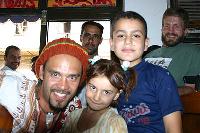| |
Taken from Salt Lake Tribune (Jan 26, 2005)
Musical activist
Michael Franti searches for the human cost of war in his Slamdance documentary
by Dan Nailen

Musician Michael Franti of Spearhead
traveled to Iraq, Israel and Palestine
to film "I Know I'm Not Alone,"
a musical diary of his search
for the untold stories
among Middle East violence.
|
"I really wanted to know firsthand what was going on over there," says musician/activist Michael Franti of Spearhead, about why he traveled to the Middle East last summer to make "I Know I'm Not Alone," a musical diary and documentary premiering Thursday at the Slamdance Film Festival.
"I was tired of listening to generals and politicians tell us about the war, because they always talk about the military cost," he added. "I wanted to know about the human cost."
What Franti found, and what he shows in his remarkable documentary, is rarely seen in mainstream films or news clips coming out of the region. Franti traveled,guitar in hand, to Iraq, Israel and Palestine, and was taken aback by how easy it was to travel to these war-torn areas with no special visa or security clearance.
Franti finds remarkable stories at almost every turn, whether it's the underground tattoo parlor in Baghdad that was forbidden under Saddam Hussein's regime, or musicians in an Iraqi heavy-metal band who describe how difficult it was to find instruments and safe places to play during the former dictator's rule. In Israel, Franti plays his guitar as he walks the streets, thrilling the children who start following him, but inadvertently strolling into a forbidden area and being shot at by Israeli troops.
Throughout, Franti's music infuses the film with energy and passion, and there are numerous clips of him performing for and with native children, as well as with United States military personnel who often seem just as thrilled to hear music amid the madness of war. A scene of Franti performing his song "Bomb the World" - featuring the line "You can bomb the world to pieces, but you can't bomb it into peace" - for a group of uneasy U.S. soldiers in a Baghdad hotel bar is one of the film's most memorable.
"For me, the most striking thing was to see the healing power of music firsthand, that the music we sing in a church or a mosque or around a campfire or to our children is so powerful," Franti said.
The sight of a tall, dreadlocked black man walking the streets with a guitar was puzzling to many people, Franti said.
"Just visually, people were freaked out by me," he said. "I asked if they knew Bob Marley and they had never heard of him. They only knew Arabic music. They were baffled by my hair, baffled by my height."
Franti said seeing the destruction in Iraq and on the Gaza Strip ultimately reinforced his pacificism.
"I have a tremendous empathy for the soldiers, even more than I had before," Franti said. "I always thought that people who join the military do it to make a better life for themselves, and now these guys and women are over there and they're just sitting ducks."
"When I was there, I thought, 'Man, I really want to give a voice to those people.' I saw 'Control Room' and 'Fahrenheit 9/11,' but those movies are mostly about the military. My film is just about people."
Voice for the people
|
|